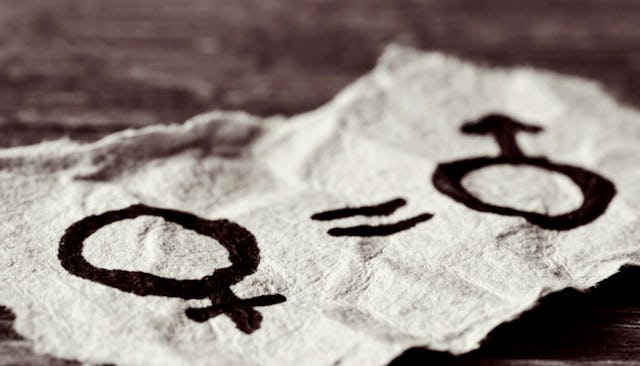A Quick Reference Guide For Popular Progressive Terms

There are a lot of terms floating around these days, being used in everything from everyday conversations to news headlines, and while our aim should always be to utilize politically correct language, it is understandable to be confused by unfamiliar lingo.
For example, many of us have been asking the question: What on earth is intersectional feminism? This is not a new term, but for many, this is an unfamiliar concept. As the political climate in this country continues to become more divisive, non-political junkies everywhere (basically, most of us) are forming strong opinions on what is playing out on SNL, the evening news, and social media newsfeeds on the daily. In order to be more socially aware, it helps to familiarize ourselves with some of the more frequently used terms:
Ally
An ally is a person who does not identify with a particular group of people, but who supports their right to equality. For example, being a gay ally during the fight for marriage equality meant being a straight or non-LBGTQ person who supported the equality movement.
Centrist
A centrist is a person who falls equally between Republican and Democrat and identifies, generally, as an independent or who will choose a party on the left or right, but holds moderate political views.
Cis
Cis, or cisgender, describes a person who identifies with their birth sex.
Conservative
A person who is most likely a Republican who believes in smaller federal government, free markets, bigger military, and stronger national defense, and typically holds on to what they deem to be “traditional values” such as rallying against marriage equality.
Cultural Appropriation
When one culture adopts or borrows components of another culture. For example, when white boys wear dreadlocks. Dreadlocks have been a political and religious statement throughout history, from Tibetan Buddhists to Rastafarians.
Emotional Labor
When a white person asks a person of color to explain why they feel oppressed or to give examples of their personal experience of oppression. This is insensitive and offensive as it forces a person of color to defend their experience and possibly relive traumatic emotions while doing so and positions the white person in a role of judgment.
Feminist
Anyone who believes that men and women should be given the same rights, and the same access to those rights, creating gender equality across the board.
Gaslighting
When one person or group of people manipulates another person or group of people for nefarious means by forcing them to question their own reality.
Genderfluid
A person whose gender identity is not fixed, and can’t be contained with the “male” or “female” label.
Gender Nonconforming
A person who does not adhere to society’s stereotypical gender roles.
Immigrant vs. Undocumented
An immigrant is a person who migrates from outside of the United States and goes through the motions of becoming a legal U.S. citizen. An undocumented person, typically a worker, is someone who came to the U.S. to seek a better life but has not obtained legal citizenship. Some political rhetoric uses the term “illegals” which is insensitive and offensive.
Intersectionality
Intersectional feminism is a movement that aims to be more inclusive of color, religion, sexual orientation, and other factors that are often ignored in the greater discourse on equality.
LGBTQ
LGBTQ is an acronym for lesbian, gay, bisexual, transgender, and queer/questioning. This refers to a group of people who are often politically and socially marginalized based on their sexual orientation or gender identity.
Liberal
A liberal is the political opposite of a conservative. Liberals are left-leaning, typically identify as Democrats, and believe in social justice and progressive causes. They tend to believe that government should be responsible for addressing and resolving social and economic disparities.
Microagression
This is a term that refers to commonplace language or actions based on race that are perceived by people of color to be hostile, demeaning, or insulting, but are often viewed as “typical conversation” by white folks. For example, asking a person of color “What are you?” or touching their hair without their consent.
Non-Binary
People who identify as being both female and male are considered non-binary, but the term also applies to anyone who does not fit the male-female binary, like those who are genderfluid. Note that this is different from “gender nonconforming” in that non-binary is something that a person feels and identifies with, whereas a person who is gender nonconforming is breaking down social barriers around stereotypes based on appearance.
Pansexual
A person who identifies as pansexual is one who is attracted to people of all sexual and gender identities and is not tied to male or female, straight or gay only.
Transgender
A person whose gender and personal identity differs from their birth sex (the sex on their birth certificate).
White Fragility
An attitude of defensiveness at the slightest mention of racial issues. Typically, this includes displaying a range of emotions such as fear and guilt but also includes arguing, silence, or avoiding any discussion of race whatsoever. See also white privilege.
White Privilege
White privilege is a term that describes the political, social, and economic benefits given to and experienced by white people but which are not extended to non-white people. All white people, across all socio-economic spectrums, have white privilege.
White Savior
White savior is a mentality held by some white people, either intentionally or not, that they are saving or rescuing people of color when they enter into conversations or actions around racism. This is also often called “whitesplaining.”
POC
POC means a person or people of color.
WOC
WOC means a woman or women of color.
While this is certainly not a complete list of terms that are being used in conversations around race and gender and politics, this is a great place to start the conversation.
This article was originally published on